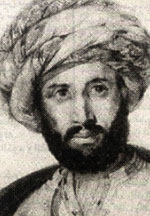
Back رفاعة الطهطاوي Arabic رفاعه الطهطاوى ARZ Rifaə Təhtavi Azerbaijani Rifa'a Al-Tahtawi Catalan ڕیفاعە تەھتاوی CKB Rífáʿa Ráfiʿ at-Tahtáwí Czech Rifāʿa at-Tahtāwī German Rifa'a Al-Tahtawi Spanish رفاعه طهطاوی Persian Rifa'a al-Tahtawi Finnish
Rifa'a at-Tahtawi | |
|---|---|
رفاعة الطهطاوي | |
 | |
| Born | October 15, 1801 |
| Died | May 27, 1873 (aged 71) Cairo, Khedivate of Egypt, Ottoman Empire |

Rifa'a Rafi' at-Tahtawi (Arabic: رفاعة رافع الطهطاوي, romanized: Rifāʿa Rāfiʿ aṭ-Ṭahṭāwī;[a] 1801–1873) was an Egyptian writer, teacher, translator, Egyptologist, and intellectual of the Nahda (the Arab renaissance).
One of the first Egyptian travellers to France in the nineteenth century,[1] Tahtawi published in 1834 a detailed account of his 5-year-long stay in France, Takhlis al-ibriz fi talkhis Bariz ('The Extrication of Gold in Summarizing Paris'[2]), and from then on became one of the first Egyptian scholars to write about Western culture in an attempt to bring about a reconciliation and an understanding between Islamic and Christian civilizations.
In 1835 he founded a School of Languages in Cairo, and he was influential in the development of science, law, literature, and Egyptology in 19th-century Egypt. His works influenced those of many later scholars such as Muhammad Abduh.
Cite error: There are <ref group=lower-alpha> tags or {{efn}} templates on this page, but the references will not show without a {{reflist|group=lower-alpha}} template or {{notelist}} template (see the help page).